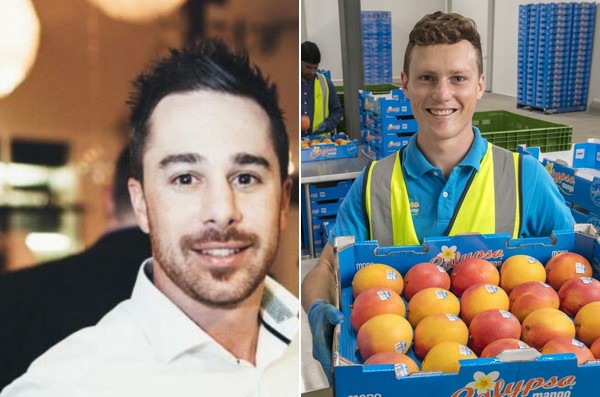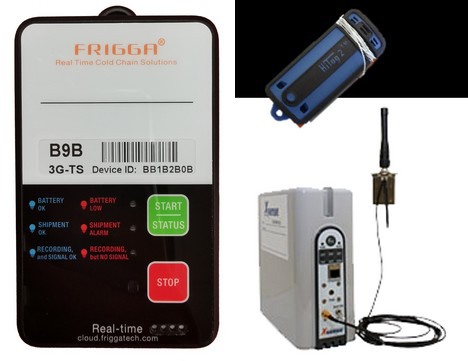Several mango exporters trialled the use of loggers for real-time (RT) shipment monitoring this past season, two of them embarked on a more planned program of activity to identify and manage risks in their supply chains.
Darcy Holmes works for Perfection Fresh as their Vapour Heat Treatment (VHT) Authorised Officer (AO). Perfection Fresh are collaborating with the Department of Agriculture and Fisheries (DAF) on a Cooperative Research Centre for Developing Northern Australia (CRCNA) project to enhance cold chain monitoring and management of Calypso mangoes to China and South Korea.
One of their aims is to understand and overcome cold-chain issues including those encountered with sea freight. Lower sea freight costs (relative to air freight) make Australian mangoes more competitive against our main export rivals (Peru and Chile) in China and South Korean markets.
Darcy has been testing two types of autonomous download temperature loggers. For export, he uses RFID (radio frequency identification) tags (single trip loggers) to transmit data from the shipment to receivers located at key points along the supply chain. The receivers then send the data to a cloud-based platform which is readily accessible to approved chain members using secure username and password access. This logger type is most suited to well established, high volume supply chains. It is suitable and approved for sea and air freight.

Darcy was very happy with the performance of the RFID system but noted that the shipment with the tag needs to pass relatively close to the static receiver to ensure data are transferred to the cloud. This system recommends < 200 m between the tag and receiver, but this should be checked for each receiver installation point.
Perfection Fresh also deployed a SIM-based, reusable logger in their domestic leg of the export chain. It relies on cellular communication to upload temperature and location information to the cloud. The loggers store the data and provide updates when in range of a mobile network. They were easier to set up compared with RFID because a receiver was
not required. They are useful for checking established supply chains or evaluating new ones. These loggers were used strategically in domestic supply chains (from farm to VHT facility). Darcy said, “The SIM loggers showed live temperature and location data, which allowed us to forward plan at the VHT facility to make sure we were ready when the consignment arrived”.
According to Darcy, “The reusable loggers worked very well in our situation. We collected the loggers at the treatment facility and posted them back to the farms every 7 days to be reused. Although the re-useable option is a little more costly up-front (relative to single use loggers) we didn’t have to buy as many and can re-use them season after season.”
Use of the real-time loggers revealed a couple of cold-chain issues which are now being addressed. In one supply chain, the mangoes were not cooled sufficiently at the packing shed prior to loading into the truck. Secondly, mangoes were occasionally stationary for a day during road transport from the farm to Brisbane.
Perfection will continue working with the Chinese and South Korean importers in 20/21 season aiming to increase sales volume without compromising fruit quality. Tracking of shipments will remain a valuable tool to detect and enable Perfection to correct cold chain problems.
Frank Frappa is the General Manager for International Sales with LaManna Premier Group. The company undertakes farming, distribution, ripening, packaging and marketing of fresh fruit and vegetables.
Last mango season, LaManna used real-time SIM-based loggers for the first time to track a sea-freight shipment to Malaysia. Previously they had used USB loggers, so why the change to real-time SIM-based loggers? Frank said that they wanted to track their produce and get as much information as possible. These loggers report location and temperature of the shipment and provided there is connectivity, this information is accessed in real time. USB loggers are better than nothing, but you can only get the temperature information from the importer if they can find the logger and are willing to download and email the data.
Frank says, “We are particularly concerned with ensuring that freight forwarders maintain the correct cold chain temperatures. In mangoes we need the freight forwarders to hold them at 12˚C to maintain their colour. If they are at 16-18˚C for more than 12-24 hours then we lose that colour stage due to ripening, which shortens the shelf-life at the importer.”
Alerts are sent via SMS and email if the shipment temperature is outside specified limits. The freight forwarders can then be contacted to rectify the situation before it gets out of hand.
The initial positive experience with real-time loggers in mango, encouraged the company to use these loggers for their stonefruit consignments to ensure that the cold chain was being maintained. Frank commented that “These single-use real-time loggers give us peace of mind for a small outlay of around $80 each”.

Darcy and Frank used Frigga 2G/3G Real Time loggers (Photo 1.) which are suitable for all applications except air freight. Darcy’s RFID option was the Xsense system (Photo 2.) which does not require airline permission and is suited to larger volume, more frequent export consignments to one or two importers.
It is important to note that there are other brands/types of real-time and RFID loggers available in Australia.
Visit our website for more information on the supply chain innovation research program and access to factsheets on temperature monitoring technologies.
The Serviced Supply Chains project is funded by the Hort Frontiers Asian Markets Fund (project AM15002), part of the Hort Frontiers strategic partnership initiative developed by Hort Innovation, with co-investment from the Department of Agriculture and Fisheries (Queensland), Department of Jobs, Precincts and Regions (Victoria), Manbulloo (mangoes), Montague Fresh (summerfruit), Glen Grove (citrus), the Australian Government plus in-kind support from the University of Queensland and the Chinese Academy of Sciences
For more information:
John Agnew
Department of Agriculture and Fisherie
Tel: +61 436 849 357
Email: john.agnew@daf.qld.gov.au
